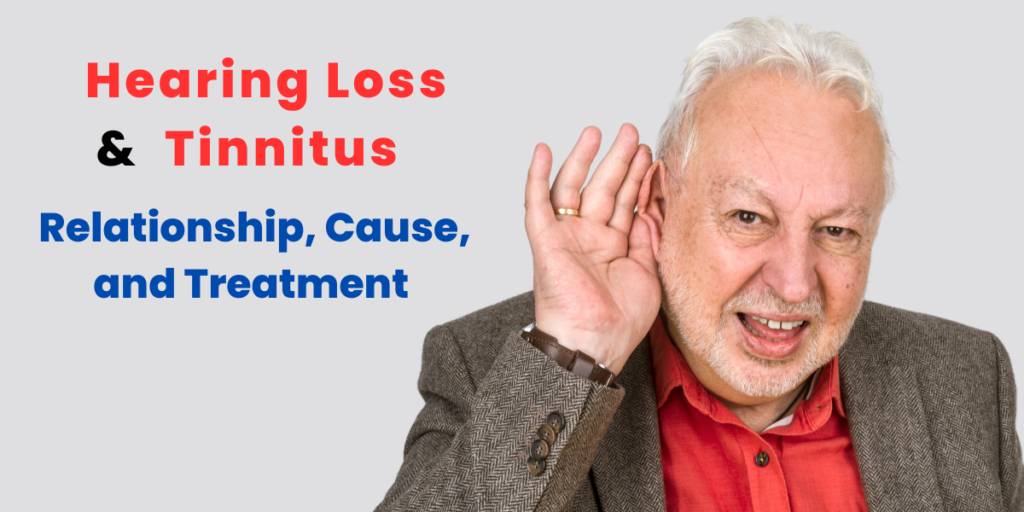
Hearing Loss and Tinnitus: Relationship, Cause, and Treatment
Hearing loss and tinnitus are more common than you might think. If you’ve ever experienced a ringing in your ears, you’re not alone. In fact, many people with hearing loss also report having tinnitus. In this blog post, we’ll explore the relationship between these two conditions, their causes, and what you can do to manage them effectively.
What is Tinnitus?
Tinnitus is the perception of sound in the ears or head when no external source of sound is present. It can manifest as a ringing, buzzing, hissing, or clicking noise, and its intensity can vary from person to person. Some people experience it constantly, while others may have intermittent episodes. Tinnitus can be a standalone condition or a symptom of underlying issues, such as hearing loss, ear injury, or exposure to loud noises. Although it is not a disease in itself, tinnitus can be incredibly disruptive and lead to difficulties in concentration, sleep disturbances, and even emotional distress. Understanding what tinnitus is can help individuals better manage their symptoms and seek appropriate treatment.
Understanding the Relationship Between Hearing Loss and Tinnitus
Did you know that up to 90% of people with tinnitus also experience hearing loss? That’s a significant number! While tinnitus often manifests as a ringing, buzzing, or hissing sound, it can be frustrating and disruptive. Most commonly, tinnitus occurs due to damage in the auditory system, whether from noise exposure, age, or other factors.
Why Do They Occur Together?
The connection between hearing loss and tinnitus isn’t just coincidence. When your hearing is impaired, your brain receives less auditory input. To compensate for this lack of stimulation, your brain might increase its sensitivity, leading to that annoying ringing sound we associate with tinnitus.
For instance, if you have high-frequency hearing loss, your tinnitus may also present as a high-pitched noise. Some people even experience tinnitus only in one ear if they have unilateral hearing loss. However, this isn’t a hard rule—tinnitus can sometimes occur without any accompanying hearing loss.
What Causes Hearing Loss and Tinnitus?
Noise Exposure
One of the leading causes of both hearing loss and tinnitus is prolonged exposure to loud noises. Whether it’s loud concerts, industrial environments, or even listening to music with headphones at high volumes, these sounds can damage the delicate hair cells in your inner ear. Once these cells are damaged, they don’t regenerate, leading to permanent hearing loss and possibly tinnitus.
Age-Related Changes
As we age, it’s natural for our hearing to decline. Age-related hearing loss is common, and it often starts after the age of 50. This gradual loss of hearing can also lead to increased awareness of sounds that aren’t there, resulting in tinnitus.
Hidden Hearing Loss
Have you heard of hidden hearing loss? This is when standard hearing tests show normal results, but there’s still damage at the synapses between the hair cells and the auditory nerve. This type of hearing loss can lead to increased sensitivity and may contribute to tinnitus.
Other Factors
Tinnitus can also be caused by factors unrelated to hearing loss, such as:
1- Stress and Anxiety: High stress levels can exacerbate tinnitus symptoms.
2- Medical Conditions: Issues like TMJ disorders or ear infections can also lead to ringing in the ears.
3- Certain Medications: Some drugs have side effects that include tinnitus.
Treatment Options for Hearing Loss and Tinnitus
Hearing Aids
If you have both hearing loss and tinnitus, hearing aids can be a game-changer. Many people report significant relief from tinnitus symptoms when using hearing aids, as they improve overall hearing and reduce the brain’s focus on the ringing sounds.
Sound Therapy
Sound therapy involves using background noise to mask the tinnitus. This can be anything from white noise machines to soothing music. The idea is to provide your brain with alternative sounds to distract it from the ringing.
Cognitive Behavioral Therapy (CBT)
CBT can be effective in helping you manage the emotional aspects of tinnitus. This type of therapy teaches you strategies to cope with the stress and anxiety that often accompany the condition.
Lifestyle Changes
Simple lifestyle changes can make a big difference:
. Protect Your Ears: Use earplugs or earmuffs in loud environments.
. Manage Stress: Techniques like mindfulness, yoga, or meditation can help reduce stress levels.
. Limit Caffeine and Alcohol: Both can exacerbate tinnitus symptoms for some people.
Consider Supplements
If you’re looking for an additional way to manage your tinnitus, consider trying Quietum Plus. This supplement is formulated to support ear health and reduce the symptoms of tinnitus. Many users have found it helpful in managing their ringing ears, so it might be worth a shot!
Quietum Plus Supplement for Hearing and Brain Health
Quietum Plus is a natural supplement designed to support hearing and brain health, particularly for those experiencing tinnitus. Formulated with a blend of herbal ingredients and nutrients, it aims to improve auditory function and reduce the perception of ringing in the ears. The ingredients work synergistically to enhance blood flow to the ears, protect against oxidative stress, and promote overall neural health. Many users report that incorporating Quietum Plus into their daily routine has helped alleviate tinnitus symptoms and improve their quality of life, making it a valuable option for those seeking relief.

FAQs about Hearing Loss and Tinnitus
- What is the relationship between hearing loss and tinnitus?
Hearing loss and tinnitus are closely linked. Up to 90% of people with tinnitus have some form of hearing loss, often due to damage in the auditory system. - Can tinnitus occur without hearing loss?
Yes, tinnitus can occur independently of hearing loss. Various factors, including stress, TMJ disorders, and certain medications, can cause tinnitus even if your hearing is normal. - What treatments are available for hearing loss and tinnitus?
Treatment options include hearing aids, sound therapy, cognitive behavioral therapy, and lifestyle changes. Additionally, supplements like Quietum Plus may help manage tinnitus symptoms. - When should I seek help for tinnitus?
You should consult a healthcare professional if your tinnitus is persistent, disruptive to your daily life, or accompanied by other symptoms like dizziness or sudden hearing loss. - What is hidden hearing loss?
Hidden hearing loss refers to a type of hearing impairment that isn’t detectable by standard hearing tests. It involves damage to the synapses in the auditory system, which can lead to increased sensitivity and tinnitus.
Conclusion
Understanding the relationship between hearing loss and tinnitus can help you take the right steps towards managing these conditions. If you experience symptoms, don’t hesitate to consult a hearing specialist. Remember to consider lifestyle changes and treatments like hearing aids or supplements like Quietum Plus to help reduce your tinnitus. Taking action now can lead to a more peaceful and enjoyable life without the constant ringing in your ears!
